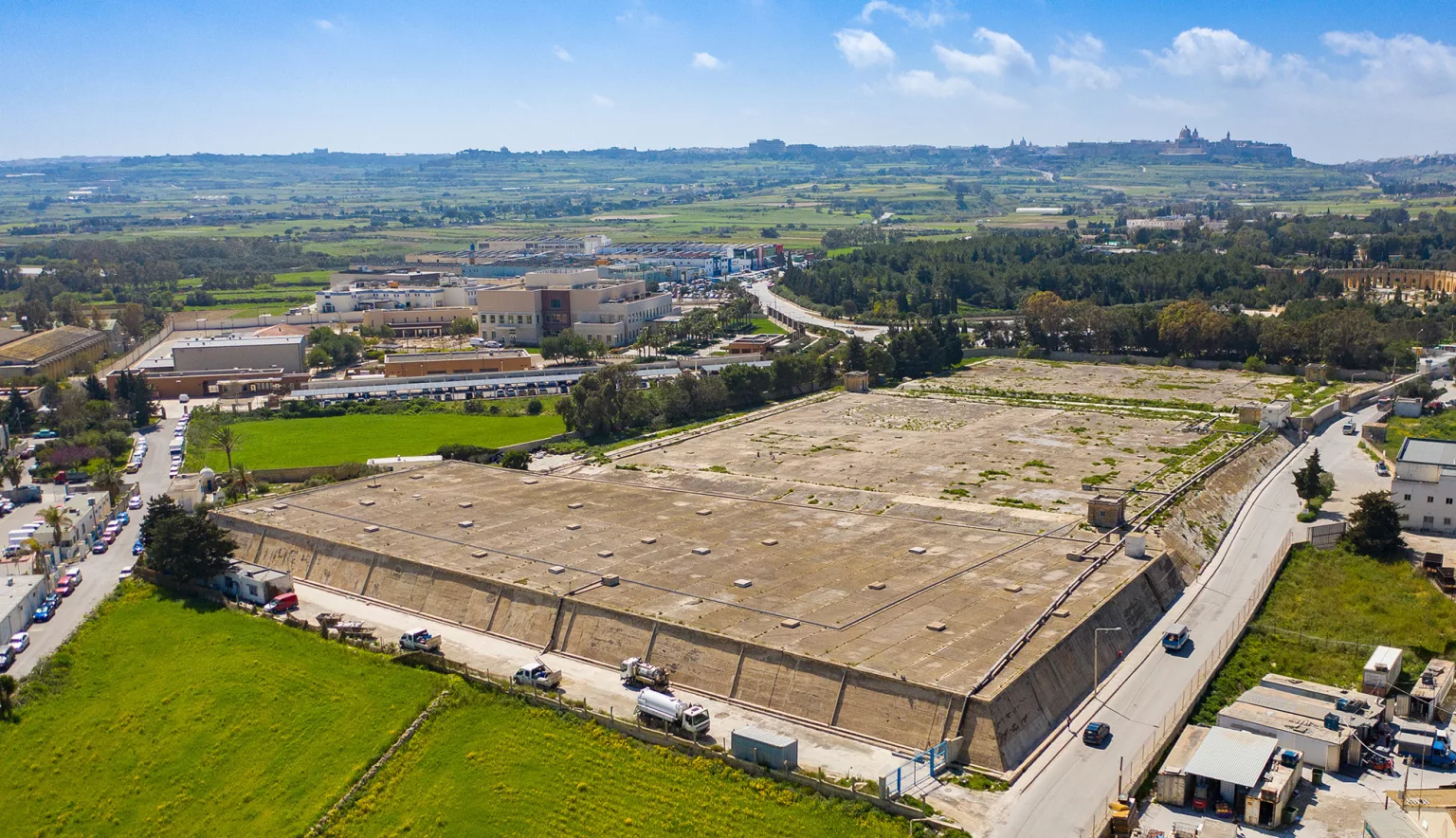We talk to Water Services Corporation about how Malta has become a world leader in water management, pioneering reverse osmosis and leakage management strategies.
MANAGING MALTA’S WATER SUPPLY
The commodities of the next generation will be data and water, because both will be key to the survivability of nations and communities,” explains Ivan Falzon, CEO of Malta’s government-run Water Services Corporation.
According to the United Nations, the world’s water usage has been growing at over twice the rate of population increase in the last century. While those living in arid regions might be aware of water’s value and scarcity, many of us are not. Falzon was once one of them.
“My previous experience with water is that I turned on the tap, and water is there, and that’s it,” he tells me.
But since taking on the role of CEO back in March, Falzon has become more appreciative of the complex processes of water supply, treatment and conservation. With a background in aviation sales and revenue management, he has had a varied managerial career across the public and private sectors, most recently as CEO for Malta’s main Mater Dei Hospital between 2014 and the start of this year.
“I do believe that the CEO post is temporary; it shouldn’t be more than three or four years. A CEO stint comes with a business plan and once you deliver that business plan then it’s time to move on,” he says.
This allows for a continual, dynamic managerial cycle and stops a corporation from stagnating. Falzon confesses to being excited and challenged by his new role, and over the course of our conversation outlines his ambitious ideas for Water Services Corporation.
“We are finalising a three-year business plan which is based on quality, efficiency and effectiveness. You can be efficient without being effective and effective without being efficient. The main pillar remains quality, which is applied to everything from how we answer the phone to how we deal with the most complex engineering issue,” he explains.
ISLANDS OF INNOVATION
Malta’s topography creates unique challenges when it comes to water management.
“We are an island, the borders are natural, and that provides us with some challenges. We don’t have rivers, so traditionally water was extracted from the groundwater table. Malta was always at the forefront of how to take seawater and turn it into potable water,” the CEO tells me.
The first desalinisation plants were established on the Maltese archipelago during the 1880s, while it was under British rule. Some of the water infrastructure developed by the British – including boreholes and groundwater tunnels – is still in operation today.
That’s not to say that Malta isn’t forward-looking when it comes to water management. These days water infrastructure consists of around 1500 kilometres of sewer network spread across the islands, three treatment plants for wastewater and around 2500 kilometres of drinking water pipelines. The country is widely known for its expertise in Reverse Osmosis desalination technology, which it first adopted in 1982, after seeing a pilot project in Florida.
“What was a beta test in America was accepted as the way forward here. Malta, being a small island of 450,000 people, was therefore already at the forefront of reverse osmosis technology in 1982,” Falzon explains.
Since then, Malta has opened a new reverse osmosis plant every decade and is now considered an industry leader in the technology, collaborating with other governments and top industry players on projects.
But its strategy, Falzon explains, is not solely focused on production.
“There is a cost to producing an infinite amount of water. You need a holistic approach and a circular economy to manage your network efficiently,” he says.
“Over the years the corporation was lucky to have some people that focused on a leakage control strategy, and we now have amongst the best leakage rates in Europe, maybe across the world, and our people collaborate frequently with other international stakeholders to assist with leakage strategies.”
Alongside these two areas of expertise, Malta is also making forays into the interesting field of new water technology (also known as HPTTW – highly polished tertiary treated water) initially developed in Singapore. It involves treating sewer water with reverse osmosis technology and making it into ‘new water’. This water has been repeatedly and rigorously tested, and it by far exceeds the minimum quality requirements in its class.
“The government’s policy is to distribute it to the agriculture industry, farmers, tourism and use it to replenish groundwater,” he adds.
SMART INVESTMENTS
Falzon plans to make widespread changes to Water Services Corporation over the next three years through quality control, training and investment.
“I found a corporation that was already robust in terms of forward-looking investments. We are currently implementing a massive project worth 160 million euros, which is connecting all these nodes of the network to make them more efficient but also creating a process of automation,” the CEO says.
“Automation and real-time actions are key in the sector. Security of supply depends on timely actions. If you see something going wrong, you cannot depend on someone looking at the screen to act. We are talking about massive investments to improve efficiency, improving effectiveness but also to automate.”
One of the largest projects featured in Water Service Corporation’s business plan is an AI model, which it will use to help how it blends and stores its water. That will require getting all of its pumps online with effective controls in place, which will require investment and planning. Correctly implementing this automation strategy will also involve working with new suppliers and innovative personnel.
Improving efficiency is not solely to improve profitability – Water Services Corporation is eager to improve its carbon footprint and green credentials. Its 160-million-euro project is a net-zero emissions project, and it is open to further ideas on enhancing its power to production ratio.
“One of the advantages of the sewage system in Malta is that it is, at large, driven by gravity – you don’t need power. Yes, we do have pumps at the far end of systems and networks, which we will have to work on developing.
“We are looking at ways to generate power onsite at our plants, with onsite investments, partnering with organisations in the industry, as our experience is mainly in production and distribution,” Falzon says.
Another way to improve efficiency and reduce water waste is through community education and engagement. Falzon recently met with local stakeholders to push forward the concept of smart developments from the design stage. Water Services Corporation also recently embarked upon a campaign to alert people to leakages in their properties. It already has tools on its website, allowing customers to check for leakages, but the new system operates in real time, alerting people who have a possible abnormally high use of water at their residence.
“The engagement we saw from the public fills us with courage. You could say, ‘let the people waste the water, because then they will pay for it and we will make more money’, but we also have an obligation to educate people. We will provide good quality water at a fair and reasonable price, accessible to all, but that water has to be used well,” the CEO says.
Water Services Corporation is currently working with a PR professional on communicating with clients in non-technical jargon to increase engagement. For example, it is considering changing its bills to litres rather than cubic metres, as the former will be easier for clients to visualise.
“If need be, we might design them something to show the quantity of water being used. The clients deserve to be communicated within a language they understand,” Falzon adds.
“One of the advantages of the sewage system in Malta is that it is, at large, driven by gravity – you don’t need power”
Ivan Falzon, CEO, Water Services Corporation.
EVERY CLOUD HAS A SILVER LINING
In February 2020, it looked like Water Services Corporation was all set for a record-breaking year, with January alone experiencing a 10 percent increase in water production. But COVID-19 disrupted that, and many upcoming projects.
“Our key plan is to recover and realign ourselves with this new reality. The second stage is to stabilise and adapt to this situation as it develops. We are seeing changes from one month to the next. For example, England is our largest tourism revenue; one month it is open for business and then it is closed, creating fluctuations in our economy. Of course, you can’t hire or fire people based on what England does, so we will use this time to stabilise and invest in our resources,” Falzon tells me.
This includes human resources. Water Services Corporation is planning to roll out an extensive training programme for its employees, helping align them to the new realities they will face in the future, and showing them how to interact with an increasingly automated system.
“I am pleased to say that during the COVID lockdown, most of our systems were operated, monitored and managed from bedside tables, using a simple laptop and a secure connection. That experience showed us that we can do it, but also showed us we can do it even better,” the CEO says.
Although the pandemic was disruptive for many businesses, Falzon sees a bright side to the situation.
“Every cloud has a silver lining, and COVID-19 is giving us a period of calm that Malta hasn’t experienced in six or seven years. This is thanks to a record increase in tourism arrivals and the population growing from 420,000 to 515,000 in the past five or six years, as the nation is an economic magnet for foreign workers,” he explains.
“Now we can play catch up with certain issues, such as distribution in areas where the network has been designed for a certain amount of people, but now there are many more. We hope that when we do go back to normal operations, we will be all set to face these new challenges. I am sure better days are ahead of us.”
The conversation ends with Falzon reaffirming the importance of a secure water supply to the economic development of Malta.
“We do what we do out of loyalty to the nation and the people who trust us with their money. Malta will always find the Water Services Corporation by its side,” he concludes.




















